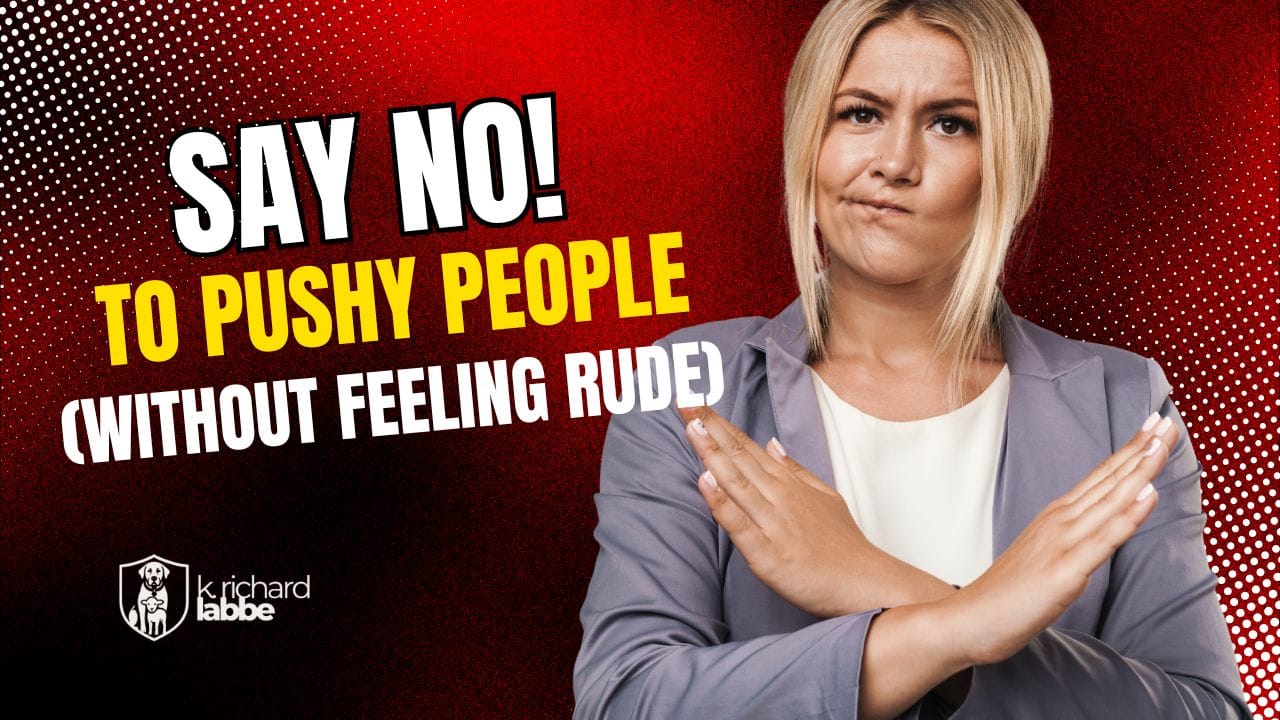How to Say No to Pushy People (Without Feeling Rude)
You don’t have to say yes to stay kind. Learning to say no—firmly and respectfully—is part of staying safe, sane, and free to live with peace and purpose.

Why This Matters
Pushy people come in all forms. It might be a stranger at your door. A family member who won’t take a hint. A salesperson who keeps talking after you’ve said no. Or someone online who keeps asking for “just one more thing.”
Sometimes they mean well. Sometimes they don’t. But either way, if you’ve ever walked away from a conversation feeling uneasy—like your no wasn’t heard or respected—you’re not alone.
Many of us were raised to be polite, helpful, and accommodating. We were taught not to make waves. And for the most part, those are good instincts.
But here’s the truth: politeness without boundaries can put you at risk.
This isn’t about becoming suspicious or combative. It’s about having the clarity and confidence to recognize when “being nice” is getting in the way of being safe—or being free.
Saying No Isn’t Unloving—It’s Wise
Scripture encourages love, patience, and kindness—but it also models boundaries. Jesus regularly stepped away from crowds. He said no to demands that didn’t align with His purpose. He didn’t explain Himself at every turn. He wasn’t harsh—but He was clear.
“Let what you say be simply ‘Yes’ or ‘No’; anything more than this comes from evil.”
— Matthew 5:37 (ESV)
A boundary doesn’t make you hard-hearted. In fact, it may be the very thing that protects your heart from resentment, burnout, or harm.
“Above all else, guard your heart, for everything you do flows from it.”
— Proverbs 4:23 (NIV)
If you’ve been afraid that saying no makes you a bad Christian or a bad friend—take heart. Saying no isn’t about rejection. It’s about protection.
Real-Life Scenarios and What to Say
Let’s take a few common situations and put some language around them:
When someone won’t stop texting or messaging:
“Hey, I’m not always able to respond right away, but I’ll reply when I can.”
If needed: “I’m stepping away from this conversation for now. Thanks for understanding.”
When a stranger or solicitor won’t take the hint:
“I’m not interested. Please leave now.”
Or: “I don’t open the door for uninvited visitors. Thank you.”
When a loved one pressures you past your limit:
“I care about you, but I can’t commit to that right now.”
Or: “I’m saying no—not because I don’t love you, but because I want to be honest about what I can give.”
“Each of you must take responsibility for doing the creative best you can with your own life.”
— Galatians 6:5 (MSG)
These phrases aren’t cruel. They’re clear. And clarity is kindness.
For Those Who Struggle to Speak Up
If you’re someone who finds it hard to say no, know this: you are not weak. You are likely compassionate, thoughtful, and sensitive to others. Those are good gifts—but they need to be stewarded well.
Practice small no’s. Role-play with a trusted friend. Write down what you’d like to say ahead of time. Start slow, but don’t stay silent forever. You are worth protecting.
And if someone in your life is easily taken advantage of—a child, an aging parent, a friend with memory loss or trauma—don’t be afraid to help set healthy boundaries on their behalf.
That doesn’t mean taking over. It means lovingly intervening when necessary, saying:
- “She’s not available for that.”
- “He doesn’t do unannounced visitors anymore.”
- “We’ve decided that’s not something we’ll be doing.”
“Speak up for those who cannot speak for themselves; ensure justice for those being crushed.”
— Proverbs 31:8 (NLT)
You’re not being controlling. You’re being protective. And in many cases, you may be the voice someone else needs until they find their own again.
What to Do When Someone Won’t Take No for an Answer
Sadly, not everyone will respect your no.
Some people push past boundaries because they’re used to getting their way. Others may become manipulative, aggressive, or even threatening.
Here’s what to remember:
- You do not owe ongoing access to someone who disregards your limits.
- You do not need to explain yourself over and over.
- You have the right to end a conversation, walk away, block a number, or report inappropriate behavior.
Say it once. Say it calmly. Then step away.
If someone refuses to stop, threatens you, or persists in harassment—document the interaction and seek help. Call a trusted friend. Reach out to your pastor. Contact law enforcement if needed.
That’s not being dramatic. That’s being discerning.
“If it is possible, as far as it depends on you, live at peace with everyone.”
— Romans 12:18 (NIV)
Some people don’t allow peace to flourish. And when that happens, it’s okay to protect yourself.
Do This Today
- Practice saying “No, thank you” aloud with a calm tone.
- Write down two phrases that fit your voice and values.
- Think of one area in your life where you’ve been saying yes too much—and consider where God might be inviting you to make a change.
- If you’re a caregiver or advocate for someone vulnerable, reflect on one boundary you may need to help reinforce on their behalf.
Final Word: Prepared, Not Paranoid
Saying no is one of the simplest and most powerful ways to reclaim peace. It doesn’t make you rude. It makes you responsible.
And when you say no with calm, grace, and love, you create space—for rest, safety, joy, and the people God truly has called you to serve.
Prepared, not paranoid. That’s how we live wisely.
Stay safe. Be ready. Online and off.
Every effort has been made to ensure the accuracy and reliability of the information presented here. While Labbe Media, LLC strives to offer clear, well-researched guidance, this content is intended for educational purposes only and isn’t a substitute for professional advice tailored to your situation. We encourage you to use this material as a starting point—and to double-check details and consult trusted professionals when making important decisions.
